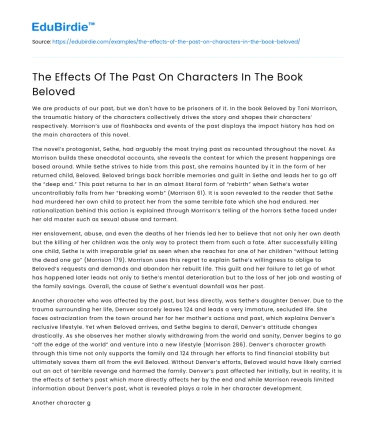We are products of our past, but we don't have to be prisoners of it. In the book Beloved by Toni Morrison, the traumatic history of the characters collectively drives the story and shapes their characters’ respectively. Morrison’s use of flashbacks and events of the past displays the impact history has had on the main characters of this novel.
The novel’s protagonist, Sethe, had arguably the most trying past as recounted throughout the novel. As Morrison builds these anecdotal accounts, she reveals the context for which the present happenings are based around. While Sethe strives to hide from this past, she remains haunted by it in the form of her returned child, Beloved. Beloved brings back horrible memories and guilt in Sethe and leads her to go off the “deep end.” This past returns to her in an almost literal form of “rebirth” when Sethe’s water uncontrollably falls from her “breaking womb” (Morrison 61). It is soon revealed to the reader that Sethe had murdered her own child to protect her from the same terrible fate which she had endured. Her rationalization behind this action is explained through Morrison’s telling of the horrors Sethe faced under her old master such as sexual abuse and torment.
Save your time!
We can take care of your essay
- Proper editing and formatting
- Free revision, title page, and bibliography
- Flexible prices and money-back guarantee
Her enslavement, abuse, and even the deaths of her friends led her to believe that not only her own death but the killing of her children was the only way to protect them from such a fate. After successfully killing one child, Sethe is with irreparable grief as seen when she reaches for one of her children “without letting the dead one go” (Morrison 179). Morrison uses this regret to explain Sethe’s willingness to oblige to Beloved’s requests and demands and abandon her rebuilt life. This guilt and her failure to let go of what has happened later leads not only to Sethe’s mental deterioration but to the loss of her job and wasting of the family savings. Overall, the cause of Sethe’s eventual downfall was her past.
Another character who was affected by the past, but less directly, was Sethe’s daughter Denver. Due to the trauma surrounding her life, Denver scarcely leaves 124 and leads a very immature, secluded life. She faces ostracization from the town around her for her mother’s actions and past, which explains Denver’s reclusive lifestyle. Yet when Beloved arrives, and Sethe begins to derail, Denver’s attitude changes drastically. As she observes her mother slowly withdrawing from the world and sanity, Denver begins to go “off the edge of the world” and venture into a new lifestyle (Morrison 286). Denver’s character growth through this time not only supports the family and 124 through her efforts to find financial stability but ultimately saves them all from the evil Beloved. Without Denver’s efforts, Beloved would have likely carried out an act of terrible revenge and harmed the family. Denver’s past affected her initially, but in reality, it is the effects of Sethe’s past which more directly affects her by the end and while Morrison reveals limited information about Denver’s past, what is revealed plays a role in her character development.
Another character greatly affected by their past is Paul D. Paul’s life on Sweet Home was hard and he eventually lost his sense of self as many he considered family were sold or killed. As a wanderer, he faced many unspeakable horrors such as being forced to sleep in ditches and being sexually abused. But when Paul D escapes and eventually finds 124, he “dropped [those] twenty-five years from his recent memory” as he instantly works to reignite an old flame between himself and Sethe and declare himself the head of household (Morrison 24). Paul D’s presence in the household is shoved out by Sethe’s obsession with Beloved, however his continuous love for Sethe pushes him to continue to persist and attempt to show Sethe her worth after Beloved left he broken. Ultimately, Paul D has been severely scarred by his past experiences, but Morrison uses this to create personal growth for Paul D so that he can create a guiding force for the story as a whole.
Morrison utilizes the past to convey the trials and tribulations of the characters. She connects the histories of each individual and how each relates to their present and shapes them throughout the novel. Without an understanding of the past events in the characters’ lives, the reader would not be able to understand the context of each characters’ actions nor be able to see the growth which came from it.






 Stuck on your essay?
Stuck on your essay?

